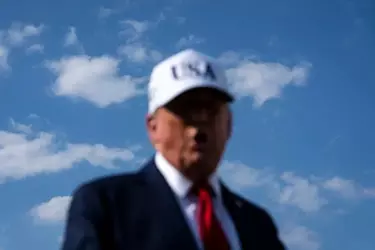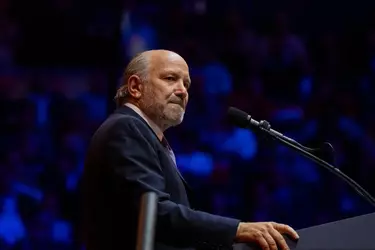By Peter Baker
Peter Baker, the chief White House correspondent, is covering his sixth presidency. He reported from Washington.
July 13, 2025

Haiyun Jiang/The New York Times
Fluoride was introduced into drinking water starting in 1945. The flu vaccine was first made available to the general public a year later. Fuel efficiency standards for cars were adopted in 1975.
Such innovations long ago became stitched into the fabric of American life, largely accepted by most Americans who came to rely on them or gave them little thought. That is, until President Trump and his team came along and began methodically rolling back widespread practices and dismantling long-established institutions.
It should come as no surprise that Mr. Trump would try to undo much of what President Joseph R. Biden Jr. did over the past four years. What is so striking in Mr. Trump’s second term is how much he is trying to undo changes that happened years and even decades before that. At times, it seems as if he is trying to repeal much of the 20th century.
On matters big and small, Mr. Trump has hit the rewind button. At the broadest level, he has endeavored to reverse the globalization and internationalism that have defined U.S. leadership around the globe since World War II, under presidents of both parties. But even at a more prosaic level, it has become evident that Mr. Trump, 79, the oldest president ever inaugurated, simply prefers things the way he remembers them from his youth, or even before that.
He has made clear that he wants to return to an era when “Cats” was the big hit on Broadway, not “Hamilton”; when military facilities were named after Confederate generals, not gay rights leaders; when coal was king and there were no windmills; when straws were plastic, not paper; when toilets flushed more powerfully; when there weren’t so many immigrants; when police officers weren’t discouraged from being rough on suspects; when diversity was not a goal in hiring or college admissions or much of anything else.

Vineyard Wind Farm in the Atlantic Ocean. Mr. Trump promises to end wind farms. Randi Baird for The New York Times
Just last month, Mr. Trump suggested going back to calling the Pentagon chief the “secretary of war,” a title retired in 1947, rather than secretary of defense, a term he dismissed as “politically correct.” Just this month, he again talked about reopening Alcatraz, the famed island prison in San Francisco Bay that was closed in 1963. Just last weekend, he said the Washington Commanders football team should not have dropped the name Redskins, which it did in 2020 amid heightened awareness of racial sensitivities.
Mr. Trump suggests that he is on a mission to halt what he considers the degradation of America by “radical left lunatics” and return the country to better times. “We’ve seen some of our political system attempting to overthrow the timeless American principles and other pillars of our liberty, and replace them with some of the most noxious ideas in human history, ideas that have been proven false,” he said earlier this month.
Mr. Trump’s shift into reverse gear reflects the broader sentiments of many Americans eager for a change in course. The United States has cycled from progressive to conservative eras throughout its history. The liberal period ushered in by Franklin D. Roosevelt eventually led to a swing back to the right under Ronald Reagan, which led to a move toward the center under Bill Clinton.
But Mr. Trump has supercharged the current swing. The influential writer William F. Buckley Jr. once defined a conservative as someone standing athwart history and yelling, “Stop!” Mr. Trump seems to be standing athwart history yelling, “Go back!”
He has gone further than noted conservatives like Mr. Buckley, Mr. Reagan, Barry Goldwater or Robert Taft might have imagined possible. While they despised many of the New Deal and Great Society programs that liberal presidents introduced over the years, and sought to limit them, they recognized the futility of unraveling them altogether.
“They were living in an era dominated by liberals,” said Sam Tanenhaus, author of “Buckley,” a biography published last month. “The best they could hope for was to arrest, ‘stop,’ liberal progress. But what they dreamed of was a counterrevolution that would restore the country to an early time — the Gilded Age of the late 19th and early 20th centuries.”
“Trump,” he added, “has outdone them all, because he understands liberalism is in retreat. He has pushed beyond Buckley’s ‘stop,’ and instead promises a full-throttle reversal.”
Indeed, although Mr. Reagan vowed during his 1980 campaign to abolish the Department of Education, which had been created the year before over the objections of conservatives who considered it an intrusion on local control over schools, he never really tried to follow through as president, because Democrats controlled the House. The issue largely faded until Mr. Trump this year resurrected it and, unlike Mr. Reagan, simply ignored Congress to unilaterally order the department shuttered.

Former President Jimmy Carter views the Panama Canal at the Miraflores Locks in Canal Zone on June 17, 1978. Charles Tasnadi/Associated Press
“Almost everything Trump has done in his second term, including his ‘one big, beautiful bill,’ has its origins in the conservative ideology of the 20th century,” Mr. Tanenhaus said, referring to the sweeping tax and spending legislation the president just signed into law.
While Mr. Reagan and Mr. Clinton both used the slogan “Make America Great Again,” Mr. Trump has made it such a signature mantra that MAGA has become a synonym for his right-wing populist movement.
But Mr. Trump has never clearly defined exactly when America was great, and when it stopped being great.
What period of American history is he trying to recapture? The 1950s of his childhood, with its “Leave It To Beaver” era of peace and prosperity, even if women and people of color were still second-class citizens and Joseph McCarthy blacklisted supposed communists? The 1980s, when Mr. Trump was in his Manhattan real estate heyday, featured regularly in the tabloids as he squired models around? The early 2000s, when he was a fixture on reality television, barking, “You’re fired!” every week?
Or is he looking even further back, to an era before he was even alive? In recent months, the president has talked repeatedly about the Gilded Age as a halcyon period in American history, highlighting William McKinley (“the Tariff King”) as his presidential model. “Our country was the wealthiest, proportionately the wealthiest, from 1870 to 1913,” Mr. Trump said at a cabinet meeting last week, suggesting a return to a time when tariffs were high and the income tax was yet to be enacted.
He seems to be reflecting in part the view of people like Howard Lutnick, the billionaire former Cantor Fitzgerald chief executive now serving as Mr. Trump’s commerce secretary. At a Trump rally at Madison Square Garden just before the November election last year, Mr. Lutnick expressed nostalgia for the time when robber baron capitalist tycoons collectively dominated the national economy.

Howard Lutnick at a campaign rally at Madison Square Garden last year. Hiroko Masuike/The New York Times
“When was America great?” Mr. Lutnick said at the rally. “At the turn of the century. Our economy was rocking. This is 1900, 125 years ago. We had no income tax and all we had was tariffs. All we had was tariffs. And we had so much money that we had the greatest businessmen of America get together to try to figure out how to spend it. That’s who we were then.” America went downhill, he said, when it had to rebuild the rest of the globe following two world wars.
The wistfulness for a time before living memory, of course, is based on a selective reading of history. By traditional measures, most Americans are far better off now than they were in 1900, when typical workers made a fraction of today’s salaries, lived without running water, indoor plumbing, electricity or modern medicine, and could expect to live until just 47, or 33 if they were Black. Neither women nor people of color enjoyed full rights of citizenship, much less the chance to become one of those “greatest businessmen” figuring out how to spend all the money.
Tariffs, which went out of favor after the onset of the Great Depression, are the most prominent example of Mr. Trump’s efforts to return to a previous way of doing things. But he has moved to abolish many of the institutions and legal frameworks of the past century, calling them wasteful bureaucracies, impediments to growth or examples of liberal excess.
In addition to trying to eliminate the Education Department and calling for the Federal Emergency Management Agency to be streamlined, Mr. Trump has sought to close or dismantle Voice of America (founded in 1942), the U.S. Agency for International Development (1961), the National Endowment for the Arts (1965), AmeriCorps (1993) and the Consumer Financial Protection Bureau (2010). He has sought to ignore or bypass laws meant to limit executive power or curb corruption, like the Impoundment Control Act of 1974 and the Foreign Corrupt Practices Act of 1977.
He has upended the traditional interpretation of the 14th Amendment as he tries to deny birthright citizenship to children of many immigrants born in the United States. His allies have proposed upending the traditional interpretation of the 22nd Amendment to allow Mr. Trump to stay in office after his second term. His Justice Department has upended the traditional interpretation of civil rights laws to stop enforcement based on “disparate impact” of policies on different groups. His I.R.S. has upended a 71-year-old rule barring tax-exempt houses of worship from endorsing political candidates from the pulpit.

Demonstrators outside the Supreme Court in support of birthright citizenship. Haiyun Jiang for The New York Times
Not every issue is personally important to Mr. Trump, but he has installed high-level officials whose views were for years not considered in the mainstream, like Robert F. Kennedy Jr., the health and human services secretary. Mr. Trump has empowered them to reopen seemingly resolved questions like the safety of the flu vaccine and fluoride in water.
The retreat from faith in inoculations comes as measles cases have shot up to the highest level since the virus was declared eliminated in the United States, and as the Trump administration is proposing to cut federal funding for basic scientific research by a third.
While much of this was foreshadowed by Mr. Trump on the campaign trail, the speed and scope of the reversals in so many areas have nonetheless shocked many in the political, legal, scientific and cultural establishments, who now find themselves debating matters seemingly settled long ago.
“I never expected in my life that the huge advances made in terms of vaccines, respect for data in evaluating causes of diseases, tests and technologies would be discarded,” said Dr. Ezekiel J. Emanuel, a co-director of the Healthcare Transformation Institute at the University of Pennsylvania who advised President Barack Obama on health care policy. “So much that was settled and is settled but being disregarded is worrisome.”
Geoffrey Kabaservice, vice president of political studies at the Niskanen Center, a Washington research institution, said Mr. Trump was tapping into a sense of unease among many Americans that the country had gone too far and too fast in some areas.
“He’s appealing to a widespread sense among Americans, particularly Republicans, that the 1950s were simpler and better times, when the country was united, proud and optimistic in ways that it no longer is now,” said Mr. Kabaservice, the author of books on liberalism and conservatism.
“It’s a vision,” he added, “that all but erases the complexity of the era — McCarthyism, the rise of television, the nascent civil rights movement, fears of nuclear war, etc. — but correctly senses that working-class values and institutions — family, neighborhood, church, union — loomed much larger then than they do now.”
But if a vision of a simpler past appeals to him, even Mr. Trump is discovering that some of what he wants to roll back may have some value after all. Not that long ago, he had declared that he planned to “phase out” FEMA and return disaster response to the states. As he visited Texas on Friday to offer support following last weekend’s deadly floods, however, his advisers emphasized that he planned to reform the agency, not do away with it.
Peter Baker is the chief White House correspondent for The Times. He is covering his sixth presidency and sometimes writes analytical pieces that place presidents and their administrations in a larger context and historical framework.
A version of this article appears in print on July 13, 2025, Section A, Page 1 of the New York edition with the headline: Trump’s Way Forward Is to Go In Reverse, by About a Century
Source (Archive)
Peter Baker, the chief White House correspondent, is covering his sixth presidency. He reported from Washington.
July 13, 2025

Haiyun Jiang/The New York Times
Fluoride was introduced into drinking water starting in 1945. The flu vaccine was first made available to the general public a year later. Fuel efficiency standards for cars were adopted in 1975.
Such innovations long ago became stitched into the fabric of American life, largely accepted by most Americans who came to rely on them or gave them little thought. That is, until President Trump and his team came along and began methodically rolling back widespread practices and dismantling long-established institutions.
It should come as no surprise that Mr. Trump would try to undo much of what President Joseph R. Biden Jr. did over the past four years. What is so striking in Mr. Trump’s second term is how much he is trying to undo changes that happened years and even decades before that. At times, it seems as if he is trying to repeal much of the 20th century.
On matters big and small, Mr. Trump has hit the rewind button. At the broadest level, he has endeavored to reverse the globalization and internationalism that have defined U.S. leadership around the globe since World War II, under presidents of both parties. But even at a more prosaic level, it has become evident that Mr. Trump, 79, the oldest president ever inaugurated, simply prefers things the way he remembers them from his youth, or even before that.
He has made clear that he wants to return to an era when “Cats” was the big hit on Broadway, not “Hamilton”; when military facilities were named after Confederate generals, not gay rights leaders; when coal was king and there were no windmills; when straws were plastic, not paper; when toilets flushed more powerfully; when there weren’t so many immigrants; when police officers weren’t discouraged from being rough on suspects; when diversity was not a goal in hiring or college admissions or much of anything else.

Vineyard Wind Farm in the Atlantic Ocean. Mr. Trump promises to end wind farms. Randi Baird for The New York Times
Just last month, Mr. Trump suggested going back to calling the Pentagon chief the “secretary of war,” a title retired in 1947, rather than secretary of defense, a term he dismissed as “politically correct.” Just this month, he again talked about reopening Alcatraz, the famed island prison in San Francisco Bay that was closed in 1963. Just last weekend, he said the Washington Commanders football team should not have dropped the name Redskins, which it did in 2020 amid heightened awareness of racial sensitivities.
Mr. Trump suggests that he is on a mission to halt what he considers the degradation of America by “radical left lunatics” and return the country to better times. “We’ve seen some of our political system attempting to overthrow the timeless American principles and other pillars of our liberty, and replace them with some of the most noxious ideas in human history, ideas that have been proven false,” he said earlier this month.
Mr. Trump’s shift into reverse gear reflects the broader sentiments of many Americans eager for a change in course. The United States has cycled from progressive to conservative eras throughout its history. The liberal period ushered in by Franklin D. Roosevelt eventually led to a swing back to the right under Ronald Reagan, which led to a move toward the center under Bill Clinton.
But Mr. Trump has supercharged the current swing. The influential writer William F. Buckley Jr. once defined a conservative as someone standing athwart history and yelling, “Stop!” Mr. Trump seems to be standing athwart history yelling, “Go back!”
He has gone further than noted conservatives like Mr. Buckley, Mr. Reagan, Barry Goldwater or Robert Taft might have imagined possible. While they despised many of the New Deal and Great Society programs that liberal presidents introduced over the years, and sought to limit them, they recognized the futility of unraveling them altogether.
“They were living in an era dominated by liberals,” said Sam Tanenhaus, author of “Buckley,” a biography published last month. “The best they could hope for was to arrest, ‘stop,’ liberal progress. But what they dreamed of was a counterrevolution that would restore the country to an early time — the Gilded Age of the late 19th and early 20th centuries.”
“Trump,” he added, “has outdone them all, because he understands liberalism is in retreat. He has pushed beyond Buckley’s ‘stop,’ and instead promises a full-throttle reversal.”
Indeed, although Mr. Reagan vowed during his 1980 campaign to abolish the Department of Education, which had been created the year before over the objections of conservatives who considered it an intrusion on local control over schools, he never really tried to follow through as president, because Democrats controlled the House. The issue largely faded until Mr. Trump this year resurrected it and, unlike Mr. Reagan, simply ignored Congress to unilaterally order the department shuttered.

Former President Jimmy Carter views the Panama Canal at the Miraflores Locks in Canal Zone on June 17, 1978. Charles Tasnadi/Associated Press
“Almost everything Trump has done in his second term, including his ‘one big, beautiful bill,’ has its origins in the conservative ideology of the 20th century,” Mr. Tanenhaus said, referring to the sweeping tax and spending legislation the president just signed into law.
While Mr. Reagan and Mr. Clinton both used the slogan “Make America Great Again,” Mr. Trump has made it such a signature mantra that MAGA has become a synonym for his right-wing populist movement.
But Mr. Trump has never clearly defined exactly when America was great, and when it stopped being great.
What period of American history is he trying to recapture? The 1950s of his childhood, with its “Leave It To Beaver” era of peace and prosperity, even if women and people of color were still second-class citizens and Joseph McCarthy blacklisted supposed communists? The 1980s, when Mr. Trump was in his Manhattan real estate heyday, featured regularly in the tabloids as he squired models around? The early 2000s, when he was a fixture on reality television, barking, “You’re fired!” every week?
Or is he looking even further back, to an era before he was even alive? In recent months, the president has talked repeatedly about the Gilded Age as a halcyon period in American history, highlighting William McKinley (“the Tariff King”) as his presidential model. “Our country was the wealthiest, proportionately the wealthiest, from 1870 to 1913,” Mr. Trump said at a cabinet meeting last week, suggesting a return to a time when tariffs were high and the income tax was yet to be enacted.
He seems to be reflecting in part the view of people like Howard Lutnick, the billionaire former Cantor Fitzgerald chief executive now serving as Mr. Trump’s commerce secretary. At a Trump rally at Madison Square Garden just before the November election last year, Mr. Lutnick expressed nostalgia for the time when robber baron capitalist tycoons collectively dominated the national economy.

Howard Lutnick at a campaign rally at Madison Square Garden last year. Hiroko Masuike/The New York Times
“When was America great?” Mr. Lutnick said at the rally. “At the turn of the century. Our economy was rocking. This is 1900, 125 years ago. We had no income tax and all we had was tariffs. All we had was tariffs. And we had so much money that we had the greatest businessmen of America get together to try to figure out how to spend it. That’s who we were then.” America went downhill, he said, when it had to rebuild the rest of the globe following two world wars.
The wistfulness for a time before living memory, of course, is based on a selective reading of history. By traditional measures, most Americans are far better off now than they were in 1900, when typical workers made a fraction of today’s salaries, lived without running water, indoor plumbing, electricity or modern medicine, and could expect to live until just 47, or 33 if they were Black. Neither women nor people of color enjoyed full rights of citizenship, much less the chance to become one of those “greatest businessmen” figuring out how to spend all the money.
Tariffs, which went out of favor after the onset of the Great Depression, are the most prominent example of Mr. Trump’s efforts to return to a previous way of doing things. But he has moved to abolish many of the institutions and legal frameworks of the past century, calling them wasteful bureaucracies, impediments to growth or examples of liberal excess.
In addition to trying to eliminate the Education Department and calling for the Federal Emergency Management Agency to be streamlined, Mr. Trump has sought to close or dismantle Voice of America (founded in 1942), the U.S. Agency for International Development (1961), the National Endowment for the Arts (1965), AmeriCorps (1993) and the Consumer Financial Protection Bureau (2010). He has sought to ignore or bypass laws meant to limit executive power or curb corruption, like the Impoundment Control Act of 1974 and the Foreign Corrupt Practices Act of 1977.
He has upended the traditional interpretation of the 14th Amendment as he tries to deny birthright citizenship to children of many immigrants born in the United States. His allies have proposed upending the traditional interpretation of the 22nd Amendment to allow Mr. Trump to stay in office after his second term. His Justice Department has upended the traditional interpretation of civil rights laws to stop enforcement based on “disparate impact” of policies on different groups. His I.R.S. has upended a 71-year-old rule barring tax-exempt houses of worship from endorsing political candidates from the pulpit.

Demonstrators outside the Supreme Court in support of birthright citizenship. Haiyun Jiang for The New York Times
Not every issue is personally important to Mr. Trump, but he has installed high-level officials whose views were for years not considered in the mainstream, like Robert F. Kennedy Jr., the health and human services secretary. Mr. Trump has empowered them to reopen seemingly resolved questions like the safety of the flu vaccine and fluoride in water.
The retreat from faith in inoculations comes as measles cases have shot up to the highest level since the virus was declared eliminated in the United States, and as the Trump administration is proposing to cut federal funding for basic scientific research by a third.
While much of this was foreshadowed by Mr. Trump on the campaign trail, the speed and scope of the reversals in so many areas have nonetheless shocked many in the political, legal, scientific and cultural establishments, who now find themselves debating matters seemingly settled long ago.
“I never expected in my life that the huge advances made in terms of vaccines, respect for data in evaluating causes of diseases, tests and technologies would be discarded,” said Dr. Ezekiel J. Emanuel, a co-director of the Healthcare Transformation Institute at the University of Pennsylvania who advised President Barack Obama on health care policy. “So much that was settled and is settled but being disregarded is worrisome.”
Geoffrey Kabaservice, vice president of political studies at the Niskanen Center, a Washington research institution, said Mr. Trump was tapping into a sense of unease among many Americans that the country had gone too far and too fast in some areas.
“He’s appealing to a widespread sense among Americans, particularly Republicans, that the 1950s were simpler and better times, when the country was united, proud and optimistic in ways that it no longer is now,” said Mr. Kabaservice, the author of books on liberalism and conservatism.
“It’s a vision,” he added, “that all but erases the complexity of the era — McCarthyism, the rise of television, the nascent civil rights movement, fears of nuclear war, etc. — but correctly senses that working-class values and institutions — family, neighborhood, church, union — loomed much larger then than they do now.”
But if a vision of a simpler past appeals to him, even Mr. Trump is discovering that some of what he wants to roll back may have some value after all. Not that long ago, he had declared that he planned to “phase out” FEMA and return disaster response to the states. As he visited Texas on Friday to offer support following last weekend’s deadly floods, however, his advisers emphasized that he planned to reform the agency, not do away with it.
Peter Baker is the chief White House correspondent for The Times. He is covering his sixth presidency and sometimes writes analytical pieces that place presidents and their administrations in a larger context and historical framework.
A version of this article appears in print on July 13, 2025, Section A, Page 1 of the New York edition with the headline: Trump’s Way Forward Is to Go In Reverse, by About a Century
Source (Archive)